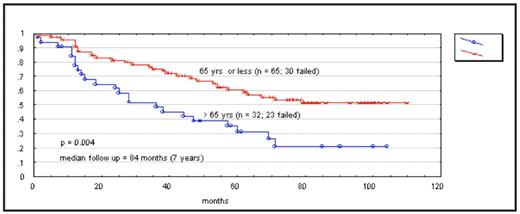Abstract
MCL has a poor outcome with current non-intense therapies. We present an update of our results utilizing an intense chemotherapy regimen comprising fractionated cyclophosphamide, doxorubicin, vincristine and dexamethasone to which rituximab has been added (R-HyperCVAD, one cycle), alternating with rituximab and high dose methotrexate/cytarabine (R-MA, one cycle) for a total of 6–8 cycles (J Clin Oncol 2006 Feb 1;24(4):724). Treatment was started at most within 2 months from the initial evaluation. Overall survival (OS) was defined as the time from start of treatment until recurrence or death from any cause. Failure-free survival (FFS) was defined as the time from start of treatment until recurrence or death from toxicity or death from treatment-related malignancy. Of 97 consecutive evaluable patients, 87% achieved a complete response (CR) or unconfirmed CR after 6 cycles and did not receive additional therapy. With a median follow up on 84 months (7 years), the overall survival and failure-free survival at 7 years was 60% and 43%, respectively. Among patients 65 years of age or younger, the 7-year OS and FFS was 68% and 52%, respectively. Important prognostic variables included age (65 yrs or less vs > 65 yrs; initial serum B2 microglobulin 3 or less mg/dL vs > 3); and initial serum lactate dehydrogenase (normal vs > normal). Further subset analysis will be presented at the meeting.
Disclosures: Hagemeister:Genentech, BiogenIdec: Honoraria, Speakers Bureau.
This data support the efficacy of this regimen for the treatment of newly diagnosed MCL. Failure-Free Survival in 97 patients with untreated MCL after R-HyperCVAD/R-MA
Author notes
Corresponding author


